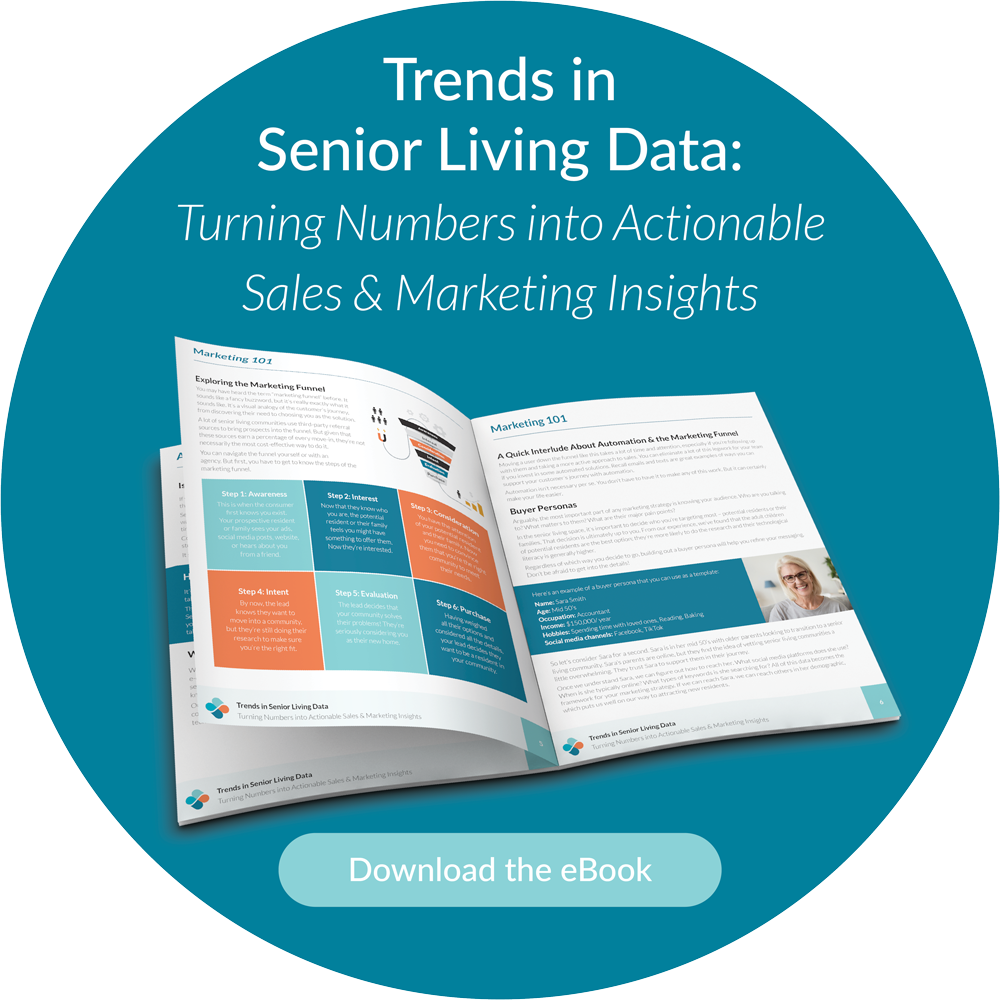The Essentials: Senior Living CRM

Even the most in-demand senior living communities should be engaging in regular resident recruitment. The competition for new residents can be fierce, as Canadian seniors have over 2,000 long-term care homes to choose from. If you want your community to be potential residents’ top choice, it’s essential to make a strong impression. CRM — or customer relationship management — is a digital tool organizations use to develop and maintain client relationships. An excellent CRM helps senior living communities handle every resident interaction, from scheduling tours to completing admissions paperwork, and make it easy for your organization to nurture positive relationships with seniors and their families.
Senior living CRM technology has revolutionized client relationships in the senior living industry. In the past, many communities tracked leads with Excel spreadsheets, Word documents, and even handwritten sticky notes. Unsurprisingly, these methods often caused chaos and inefficiency, leading to higher vacancy rates.
Investing in senior living CRM solves these issues and ensures residents get the best customer service possible. Read on to learn more about CRM, its role in senior care management, and how it can address senior living occupancy challenges.
What Is Senior Living CRM?
Senior living CRM is software that records and automates interactions with potential and current residents. Communities can use this technology to handle many routine tasks, such as:
- Scheduling tours with interested seniors
- Sending automated follow-up messages to people who have made inquiries
- Maintaining a waitlist
- Identifying the most effective marketing strategies
- Tracking where your referrals come from
CRM isn’t unique to senior living. Many industries use CRM software to find potential customers and increase sales of their products and services.
What Makes Senior Living CRM Different?
Senior living CRM applications are unique because they’re used to help staff focus on providing close, personalized attention. Programs are used to gather information about seniors’ preferences and needs and maintain regular contact throughout their decision-making process not just execute a sale. This extra attention to detail helps build lasting and trusting relationships.
Common Pre-CRM Pain Points
If your community already fills vacancies efficiently, you may wonder if you truly need to invest in a CRM. This innovative technology has many valuable benefits beyond converting leads, so it can be helpful for any senior living organization.
Here are a few common problems that this technology solves:
Inefficient Documentation Practices
Many senior living communities use multiple platforms to record documentation, create invoices, and communicate with families. This convoluted system often requires staff to enter the same information in various places, decreasing productivity and increasing the risk of human error. Using a senior living CRM streamlines workflows by centralizing documentation tasks like creating electronic health records (EHRs), billing, and recording drug administration.
Poor Communication
Essential information and leads can easily slip through the cracks if you’re trying to track prospect and resident information without a CRM. Multiple staff members could gather and share the same information, wasting time, or forgetting to contact residents or their families entirely. A senior living CRM addresses these issues by recording every interaction and automating tasks like sending follow-up emails.
Low Lead Conversions
Research reveals that most senior care marketers only manage to convert around 30% of leads to tours. A CRM can boost your conversion rates by helping you hook potential customers when their interest levels are highest. The software allows you to quickly identify and reach out to people when they visit your website or request information.
Strained Relationships with Caregivers
Family members care deeply about their loved one’s care and often become anxious or frustrated if the community they’ve entrusted to care for their family is ignoring their concerns. Keep authorized caregivers in the loop by using a senior living CRM to organize their contact information and ensure that all their inquiries get answered.
Benefits of Senior Living CRMs
Low Lead Conversions
Senior living communities gather and process vast amounts of information. This ranges from discharge instructions for residents returning from the hospital, to statistics about how many people participate in fitness classes. A CRM collects all this data and stores it in one convenient location.
Data compilation and centralization have many advantages, including:
Automated CRM Workflows
Senior living organizations frequently exchange resident records with authorized providers. Save time and increase accuracy by using a senior living CRM to automate updating electronic medication administration (eMAR) records with new prescription instructions and sharing insurance information with providers.
Fast Access to Critical Data
A CRM collects essential information, such as a resident’s allergies or emergency contact information. Staff can find all necessary information in one place, saving time during emergencies.
Centralized and Personalized Interaction Tracking
Monitor every interaction with seniors and their families from a single data hub. This information can lead to valuable insights. For instance, you may notice that leads convert to tours more often when staff answer potential residents’ emails promptly and prioritize this task.
Performance Tracking
You can assess your community’s performance based on metrics like staff productivity, profit margin, and medication errors. A senior living CRM can gather information about these benchmarks and automatically generate in-depth reports to pinpoint strengths and weaknesses.
Data Entry Simplification
Healthcare providers often feel overburdened by repetitive and time-consuming data entry tasks. For instance, over 50% of nurses cite EHRs as a source of daily frustration, and 33% believe they don’t have adequate time to complete documentation. A senior living CRM can significantly reduce this stress by streamlining data entry.
Med e-care’s CRM includes functions designed specifically to help senior living communities:
- Reduce 3rd party referrals
- Improve campaign performance
- Automate data flow into clinical tools
- Prove the ROI on your efforts
Prospect Tracking
Even the most eager seniors can’t simply pack their bags and move into your community the day after they discover it. The process of reaching and admitting prospective residents involves many steps, such as:
- Receiving referrals from clinicians
- Providing brochures
- Verifying potential clients’ insurance information
- Gathering health records
- Scheduling a move-in date
- Assessments and developing a care plan
A senior living CRM records all these steps and allows authorized staff to track each resident’s progress through the various stages. This cohesive system increases communication among caregivers and keeps the pipeline moving smoothly.
For instance, your CRM may show that a potential resident hasn’t submitted their insurance information. You can follow up with a friendly reminder, speeding up the admissions process.
Build Strong Foundations with CRM
Fostering healthy and positive relationships with potential and current residents, families, and providers is the key to success in the senior living industry. Centralize your organization’s data and revolutionize your communication with Med e-care’s senior living CRM solution.
Would you like to learn more about how Med e-care can help you?





